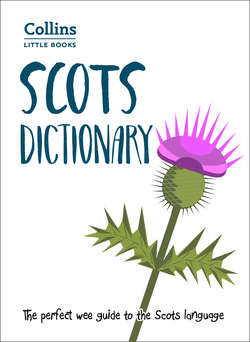Читать книгу Scots Dictionary: The perfect wee guide to the Scots language - Collins Dictionaries, Collins Dictionaries - Страница 15
ОглавлениеBhoys
Bhoys (boys) Celtic football team and its supporters are sometimes referred to as the Bhoys. [This is a mock Gaelic spelling of Boys which reflects the team’s origin among Glasgow’s Irish community]
bide To bide in a place is to live there: They were biding in a flat near the harbour. To bide in a state or condition is to remain in it: We’re no awa to bide awa. To be able to bide a person or thing is to be able to endure or tolerate it. This sense is usually used in the negative, indicating that something is intolerable: I cannae bide that man. To bide by a decision is to comply with it, even if you disagree with it: Party officials announced that they would bide by the outcome of the ballot. The past tense can be either bided, bid, or bode, and the past participle bided or bade.
bidie-in (bide-ee-in) Someone’s bidie-in is the person who is living with them as their husband or wife although they are not formally married. The word is originally from the Aberdeen area, but is now heard elsewhere in Scotland: The other significant person in McCafferty’s life is Joanna, the woman he fondly describes as his ‘bidie-in’.
biggin or bigging A biggin is a slightly old-fashioned word for a building: A sweet old granny came toddling up the brae to the biggin. In particular, the outbuildings and labourers’ cottages on a farm or estate are sometimes referred to collectively as the biggins.
bike A variant spelling of byke.
bile To bile is to boil. A fairly rude way of informing someone that they should go away, or that they are talking rubbish, is to tell them to bile their heid.
biling A biling of vegetables, especially potatoes, is enough of them to do for one meal; a Northeastern word. Biling also means very hot: Can ye no open a windae? It’s biling in here. See also boiling.
billy A billy is an old-fashioned word for a man or lad, often implying that the person is a friend or workmate.
Billy or Billy Boy In the Glasgow area, a Billy is an informal name for a Protestant, as in the sectarian football chant which begins Oh I’d rather be a Billy than a Tim. [The term is probably from the name of the Protestant King William III, who defeated the deposed Catholic King James VII (James II of England) in the late 17th century]
bing A bing is a large hill-like mound of waste from a mine or quarry: Large oil-shale bings disfigured the countryside.
binger (bing-er) A binger is a West Central Scottish slang term for a losing bet, especially one on an unsuccessful racehorse.
birk A birk is a birch tree.
birl To birl is to spin or revolve: She watched the clothes birling round in the washing machine.
birse (birss) To have or get one’s birse up is to be or become angry or annoyed. [The phrase comes from an earlier sense of birse meaning bristle]
bit 1 In parts of South and West Scotland, the place where someone lives is known as their bit: Can Kirsty come out and play at my bit? 2 A bit is a boot.
black-affrontit (black a-frunt-it) or black-affronted To be black-affrontit is to be very embarrassed or offended by something.
black bun Despite its name, black bun is not actually a bun, but is a type of very rich dark fruitcake covered in pastry, which is traditionally eaten at New Year.
blackening A blackening is a type of pre-wedding ritual carried out in some areas where the bride or groom is smeared with mud, treacle, or some similar dark-coloured substance and then often paraded through the streets by their friends.
